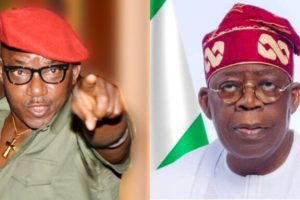
Judge Jeffrey Gilbert of the United States District Court for the Northern District of Illinois on Tuesday said President Bola Tinubu weakened his education privacy rights when he submitted a contentious certificate to run for office in 2022.
The judge said the need to confirm the genuineness or otherwise of the certificate Mr Tinubu submitted to the Independent National Electoral Commission outweighed Mr Tinubu’s personal concerns over its consequences.
Nigerian opposition leader, Atiku Abubakar, had sought a subpoena to obtain Mr Tinubu’s academic records following several inconsistencies that characterised the submissions Mr Tinubu certified under oath to the Nigerian electoral office.
Mr Tinubu had desperately fought to have his records blocked and inaccessible to Mr Abubakar, who argued he applied for the subpoena directing discovery of his credentials from Chicago State University (CSU) in order to seek Mr Tinubu’s nullification at Nigeria’s Supreme Court.
Mr Tinubu said granting his opponent access to his records would infringe on his privacy rights under Family Educational and Privacy Rights Act (FERPA), a U.S. law that protects academic records of students.
But Judge Gilbert, in his ruling on September 19, said the opposition candidate’s election petition, in which the records he sought would be used, far outweighed Mr Tinubu’s privacy interest, because he himself exposed his records to public scrutiny by submitting a controversial diploma to INEC, knowing the political stakes of other contenders.
MR Gilbert said FERPA permitted records disclosure “if it is necessary to comply with a lawfully issued subpoena or judicial order.”
“Here, the court finds that applicant’s interest in obtaining Intervenor’s records from CSU outweighs intervenor’s privacy rights because intervenor put his diploma at issue by submitting it to the INEC,” Mr Gilbert said in his ruling issued late Tuesday over the case filed on August 2.
He said Mr Abubakar’s petition was far too crucial to ignore and that it outweighed Mr Tinubu’s feeble claim to privacy rights.
“There is, however, a ‘significantly heavier burden’ on the party requesting educational records to show that the interest in obtaining the records outweighs the privacy interest of the student,” the court ruled.
The judge said Mr Abubakar satisfied the burden and met the criteria for Section 1782, the statute that allows the U.S. to turn over records “for use in a proceeding before a foreign tribunal.” Mr Gilbert ordered CSU to provide the former vice-president with all the requested records within two days.
“For all of the reasons discussed above, Atiku Abubakar’s application pursuant to 28 U.S.C. § 1782 for an order directing discovery from Chicago State University for use in a foreign proceeding [ECF No. 1] is granted,” Mr Gilbert ruled. “Respondent CSU shall produce all relevant and non-privileged documents in response to requests for production Nos. 1 through 4 (as narrowed by the court) in applicant subpoena within two days of the entry of this memorandum opinion and order.”
Mr Abubakar filed an appeal to the Supreme Court on Tuesday, seeking to overturn the September 6 judgement of the election petitions tribunal that affirmed Mr Tinubu’s victory in the February exercise. But the tribunal judges did not have the Chicago academic records that Mr Abubakar now seeks to present to the Supreme Court, which he hoped would be admitted under the court’s special circumstances rules.
The subpoena is expected to help Mr Abubakar get certified clarification under which Mr Tinubu was admitted into CSU and also the diploma he submitted to INEC, which was purportedly issued in 1979 and signed by Elnora Daniel. But Ms Daniel only arrived at CSU in 1998 from Hampton University, 19 years after Mr Tinubu was said to have graduated. She left the school in 2008 following a financial mismanagement scandal, or 14 years before June 2022 when CSU issued yet a fresh certificate in Mr Tinubu’s name under subpoena from a Nigerian lawyer who had inquired about Mr Tinubu’s education there.
CSU administrators have until Thursday evening to supply all the documents to Mr Abubakar. The school was also ordered to make its officials available to testify under oath as to the authenticity of any documents they provide in support of their claim that Mr Tinubu was a student there in the 1970s. The school had already admitted during a hearing on the matter last week that it won’t be able to authenticate Mr Tinubu’s certificate.





